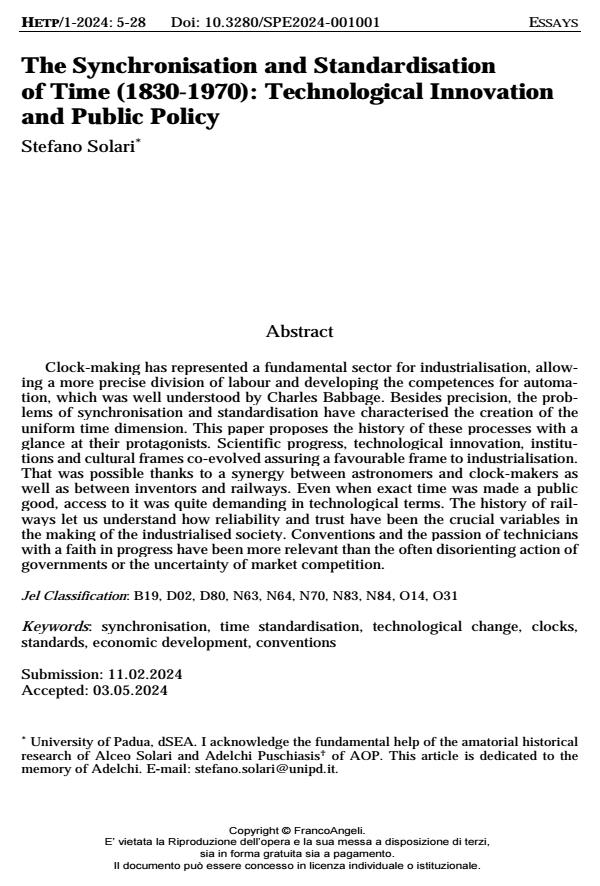The Synchronisation and Standardisation of Time (1830-1970): Technological Innovation and Public Policy
Titolo Rivista HISTORY OF ECONOMIC THOUGHT AND POLICY
Autori/Curatori Stefano Solari
Anno di pubblicazione 2024 Fascicolo 2024/1
Lingua Inglese Numero pagine 24 P. 5-28 Dimensione file 157 KB
DOI 10.3280/SPE2024-001001
Il DOI è il codice a barre della proprietà intellettuale: per saperne di più
clicca qui
Qui sotto puoi vedere in anteprima la prima pagina di questo articolo.
Se questo articolo ti interessa, lo puoi acquistare (e scaricare in formato pdf) seguendo le facili indicazioni per acquistare il download credit. Acquista Download Credits per scaricare questo Articolo in formato PDF

FrancoAngeli è membro della Publishers International Linking Association, Inc (PILA)associazione indipendente e non profit per facilitare (attraverso i servizi tecnologici implementati da CrossRef.org) l’accesso degli studiosi ai contenuti digitali nelle pubblicazioni professionali e scientifiche
Clock-making has represented a fundamental sector for industrialisation, al-lowing a more precise division of labour and developing the competences for au-tomation, which was well understood by Charles Babbage. Besides precision, the problems of synchronisation and standardisation have characterised the creation of the uniform time dimension. This paper proposes the history of these processes with a glance at their protagonists. Scientific progress, technological innovation, institutions and cultural frames co-evolved assuring a favourable frame to indus-trialisation. That was possible thanks to a synergy between astronomers and clock-makers as well as between inventors and railways. Even when exact time was made a public good, access to it was quite demanding in technological terms. The history of railways let us understand how reliability and trust have been the crucial variables in the making of the industrialised society. Conventions and the passion of technicians with a faith in progress have been more relevant than the often disorienting action of governments or the uncertainty of market competition.
Parole chiave:synchronisation, time standardisation, technological change, clocks, standards, economic development, conventions
Jel codes:B19, D02, D80, N63, N64, N70, N83, N84, O14, O31
Stefano Solari, The Synchronisation and Standardisation of Time (1830-1970): Technological Innovation and Public Policy in "HISTORY OF ECONOMIC THOUGHT AND POLICY" 1/2024, pp 5-28, DOI: 10.3280/SPE2024-001001